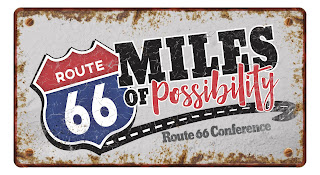Aprons Away - my new stage play celebrates women's work on Route 66
 |
| The Eagle Performing Arts and Conference Center in Pontiac, Illinois. Photo by Cheryl Eichar Jett. |
 |
| The cast of the Pontiac production with me after the Saturday evening Performance! (Photo by Steve Rensberry.) |
Here is the origin of the play: About four years ago, I began to collect stories of the women who had made significant contributions to the history and culture of Route 66, with the intent of weaving them together in a new book. In the past couple years, some of you have seen one of my programs on the various women or read one of my articles focusing on the Illinois or Missouri women. In 2017, I was inspired to start working on a play that allowed the women's voices to tell their own stories of Route 66 in a stage-play format. The book manuscript, by the way, is progressing and hopefully will see publication in 2020!
The women featured in the play range from waitresses, restaurant operators, and motel owners, to some of the early designers, architects, and engineers that significantly influenced what today we think of as the culture of Route 66. One character especially unique to the Mother Road that is included in the play is the Phillips 66 Highway Hostess. In the late 1930s, the Phillips 66 oil company developed the plan to hire a small squad of nurses to patrol the highway and inspect the company's service stations on a monthly basis. The main idea was to increase the comfort and feeling of safety for women travelers, with an emphasis on clean and sanitary restrooms and availability of assistance, whether directions, a tow, or help with a minor medical situation.
One specific Illinois woman is included in the play – Hazel Funk Holmes. Hazel was born in 1886 into the Funk family, who were early Illinois pioneers in McLean County. The Funks were farmers, land owners, lawyers, politicians, and friends and contemporaries of Abraham Lincoln. During the Civil War, when sugar from the southern states was difficult to obtain, many northern farmers established small maple syrup operations to supply sweetener for their own cooking. The Funks were one of these families, but in the late 1800s they made it a commercial enterprise. Hazel became heir to the operation in the 1920s, just in time to see early Illinois Route 4 become designated in 1926 as U.S. Highway 66 – running right past Funk's Grove Maple Sirup. Hazel is honored for her two significant contributions to the business. She put the maple sirup operation and the beautiful wooded land – a forest oasis within many square miles of farm land – into a trust to insure it would always be preserved for the Funk family descendants. And, Hazel designated the spelling of “sirup” with an “i.” “That's s-I-r-u-p, mind you,” Hazel ends her monologue in the play.
Another story that touched numerous Illinois women's lives from the late 1800s through the early decades of the 1900s was that of the immigrant Fred Harvey, the Fred Harvey company, and the Harvey Girl. Harvey started out working for the railroad, developed small lunch stops along the tracks, and eventually grew a restaurant empire which originally served passengers along the Atchison, Topeka, & Santa Fe Railroad. As automobile travel along Route 66 began to replace train travel, the “Harvey Houses” adapted to serve motorists. When Harvey made the move to replace male servers with young women, he placed newspapers in the East and Midwest to attract young women who wanted to get out on their own to come to the Southwest to work. Numerous Illinois women were among the thousands who eventually worked as “Harvey Girls” for the company from the 1880s through the company's waning days in the mid-1900s.




Comments
Post a Comment